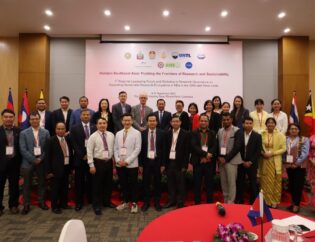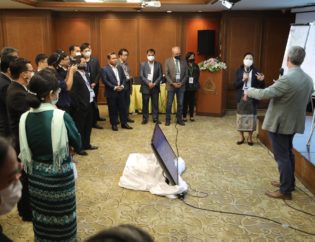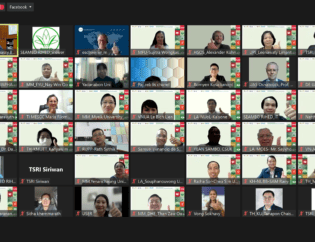
The First Researcher Networking Forum
on Thematic Area 1: Climate Change
Continued with the success of the First Regional Leadership Forum in Research Governance on Supporting Sustainable Research Ecosystems in Higher Education Institutions in the GMS and Timor-Leste, joined by 25 university senior leaders on 12-14 September 2022, SEAMEO RIHED and the Osnabrück University of Applied Sciences organised the First Researcher Networking Forum on Thematic Area 1: Climate Change on 15-17 September 2022, Asia Hotel Bangkok, Thailand. This Forum invited 25 researchers, who have been nominated by their respective universities to participate in series of activities on cross-border collaborations toward strengthening regional research development in the area of climate change in 2022-2023. Assistant Professor Dr. Romyen Kosaikanont, Center Director of SEAMEO RIHED and Professor Dr. Peter Mayer, Project Director and Professor of Osnabrück University of Applied Sciences kicked off the Forum by introducing participating researchers to the project’s overall objectives and intervention, especially on its expectation of regional collaborations and networking among Climate Change researchers in the next 2 years. The Forum was then officially opened by Dr. Pongvipa Lohsomboon, the High-Level Specialist of Thailand Science Research and Innovation. She kindly shared with the researchers in the region her insights and aspirations of Thailand efforts to tackle climate change challenges as well as potential opportunity for regional collaboration to address cross-border issues and contribute to sustainable development in Southeast Asia.

Photo: Panel Discussion on Experience Sharing and Case in Point of Cross-Border Research Projects/Collaboration
The researchers in Climate Change from 25 beneficiary universities of Greater Mekong Subregion and Timor-Leste had initial opportunity to get to know each other by presenting their own academic background, research experience and area of interest. Collective national needs and climate change research trends as well as research funding opportunities were also identified and shared among participating researchers as well as from project experts and speakers throughout 3 days. The Researchers then went on institutional visits to Centre of Excellence in Hazardous Substance Management, Chulalongkorn University and Siam University, where the researchers had opportunities to learn each institution’s research supporting structure and facilities, as well as exchange ideas and initiate future collaborations and resource sharing. Thorough the Forum, 25 researchers of Climate Change successfully are organised into 4 research groups based on common research interests and shared goals for each respective group. The Forum ended with each of 4 research group make concrete action plan and outputs for the upcoming researcher exchange programme in November and the rest of the activities of thematic area 1 on Climate Change.


Photo: 25 researchers from 6 countries identify research areas and develop regional collaboration opportunities
The researchers on Climate Change expressed their appreciation to have opportunities to work together and initiate various collaborations under the Project. They also committed to continue explore different ways to enhance the networks and support each other in the future. We would like to express our sincere appreciation to our guests of honour, guest speakers, all project experts from Southeast Asia and Germany to support designing and facilitating the activities throughout 3 days of the Forum. SEAMEO RIHED will continue to be a regional partner and support research development and collaboration among member countries and their universities toward redefining a common space in higher education and contributions to sustainable development of Southeast Asia.
As a part of SEAMEO RIHED’s Programme on Capacity Enhancement for Collective Learning and Continuous Development of Higher Education Institutions in the SEAMEO Region, the Project Horizon Southeast Asia: Pushing the Frontiers of Research and Sustainability, funded by the “SDGs-Partnership” programme, DAAD is implemented for a four-year period from 2022 to 2025. The objectives of this project are to (1) empower university leaders of the Greater Mekong Subregion University Consortium (GMS-UC), comprising Cambodia, Lao PDR, Myanmar, Thailand, Vietnam and Timor-Leste, to establish systematic research governance and supporting systems and strategically identify and formulate priority areas for collaboration and (2) facilitate cross-border research collaboration and networks of researchers in three identified fields, including: “collaborative river governance and management”, “sustainable agricultural production” and “climate change”. Ultimately, the project aims to support collective learning and intelligence, through the initiation of regional research ecosystems, that will contribute towards the new common space in higher education and the sustainable development of Southeast Asia.
For more information, please visit: https://rihed.seameo.org/



